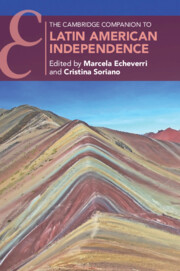Book contents
- The Cambridge Companion to Latin American Independence
- The Cambridge Companion to Latin American Independence
- Copyright page
- Dedication
- Contents
- Figures
- Maps
- Contributors
- Acknowledgments
- Maps
- Introduction
- 1 On the Origins of Latin American Independence
- 2 Constitutionalism and Representation in Ibero-America during the Independence Processes
- 3 Foreign Interaction and the Independence of Latin America
- 4 Public Opinion and Militarization during the Wars of Independence
- 5 Natural Histories of Remembrance and Forgetting
- 6 Brothers in Arms
- 7 Beyond Heroes and Heroines
- 8 Views of the Latin American Independences from the Iberian Peninsula
- 9 Shades of Unfreedom
- 10 Early Liberalism
- Bibliography
- Index
6 - Brothers in Arms
Freemasonry in Latin American Independence
Published online by Cambridge University Press: 16 March 2023
- The Cambridge Companion to Latin American Independence
- The Cambridge Companion to Latin American Independence
- Copyright page
- Dedication
- Contents
- Figures
- Maps
- Contributors
- Acknowledgments
- Maps
- Introduction
- 1 On the Origins of Latin American Independence
- 2 Constitutionalism and Representation in Ibero-America during the Independence Processes
- 3 Foreign Interaction and the Independence of Latin America
- 4 Public Opinion and Militarization during the Wars of Independence
- 5 Natural Histories of Remembrance and Forgetting
- 6 Brothers in Arms
- 7 Beyond Heroes and Heroines
- 8 Views of the Latin American Independences from the Iberian Peninsula
- 9 Shades of Unfreedom
- 10 Early Liberalism
- Bibliography
- Index
Summary
Freemasonry was one of the major conduits through which new ideas and political strategies spread during the Age of Revolution, connecting movements in Latin American regions not just with each other but with like-minded people throughout the Atlantic World. Nearly every major figure of the era has been named as a Freemason: emperors, viceroys, state ministers, archbishops, parish priests, royalist soldiers, insurgent generals, local politicians across the spectrum, women, urban workers, slaves and regular folk all could have been – and in many cases were – affiliated with Masonic Lodges or para-Masonic clubs. This chapter highlights the personal friendships and Masonic connections among this generation, bridging nationality, language and geographic space; discusses membership in a Masonic lodge as an open-ended, fluid experience that shifted and changed along with political conditions; and offers a new emphasis on the importance of Freemasonry as a vector for business, trade, and enterprise, including foreign investment, banking and the emergence of various national publishing industries – all of which were dominated by people with transatlantic Masonic connections.
Keywords
- Type
- Chapter
- Information
- The Cambridge Companion to Latin American Independence , pp. 186 - 217Publisher: Cambridge University PressPrint publication year: 2023

